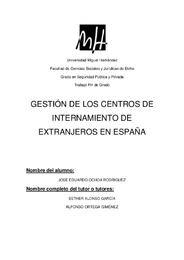Resumen :
En España se crearon los Centros de Internamiento de Extranjeros (en adelante CIE), durante el año 1985 por parte de la Ley de Extranjería, siendo regulados durante el año 1999. Estos se encargan de retener de manera preventiva y cautelar a los extranjeros que se someten a cualquier expediente de expulsión del territorio español. Durante las últimas dos décadas estos establecimientos públicos han sido objeto de controversia y debates, debido a su precaria capacidad para el manejo y control de las políticas migratorias de España. De hecho Los CIE han sido cuestionados desde su creación hace más de treinta años, debido a que representa una excepción de los estatutos y normativas legales de España, ya que se priva de libertad a una persona por una infracción de tipo administrativa, para posteriormente aplicar la expulsión del territorio nacional. Cabe destacar, que durante el tiempo de retención de los infractores, estos son sometidos a una estancia, alimentación y espacio en condiciones precarias. Esta situación ha despertado el interés de las instituciones (nacionales e internacionales) y del ciudadano común, sobre el tipo de gestión que se realiza en estos centros. Es por ello que el presente estudio busca realizar un análisis crítico y exhaustivo de la gestión de los CIE, enmarcado en la legislación española vigente, para determinar si en los CIE existe violación de los derechos humanos, debido a que llevan un modelo parecido al penitenciario. A partir de los resultados del estudio, se espera conocer la realidad actual de estos centros y realizar propuestas de mejora, que ayude a optimizar los recursos de los CIE y realizar un mejor servicio a quienes lleguen a estos centros.
In Spain, the Foreigner Internment Centers (hereinafter CIE) were created in 1985 by the Immigration Law, and were regulated in 1999. These are responsible for preventively and precautionary detention of foreigners who are subject to any expulsion proceedings from Spanish territory. During the last two decades, these public establishments have been the subject of controversy and debate, due to their precarious capacity for the management and control of Spain's immigration policies. In fact, the CIE have been questioned since their creation more than thirty years ago, because they represent an exception to the statutes and legal regulations of Spain, since a person is deprived of liberty for an administrative type infraction, to later apply expulsion from the national territory. It should be noted that during the time of detention of offenders, they are subjected to accommodation, food and space in precarious conditions. This situation has aroused the interest of institutions (national and international) and ordinary citizens in the type of management carried out in these centers. That is why this study seeks to carry out a critical and exhaustive analysis of the management of the CIE, framed in current Spanish legislation, to determine if there is a violation of human rights in the CIE, because they have a model similar to the penitentiary. . Based on the results of the study, it is expected to know the current reality of these centers and make proposals for improvement, which will help optimize the resources of the CIE and provide a better service to those who come to these centers.
|
 La licencia se describe como: Atribución-NonComercial-NoDerivada 4.0 Internacional.
La licencia se describe como: Atribución-NonComercial-NoDerivada 4.0 Internacional.
.png)
